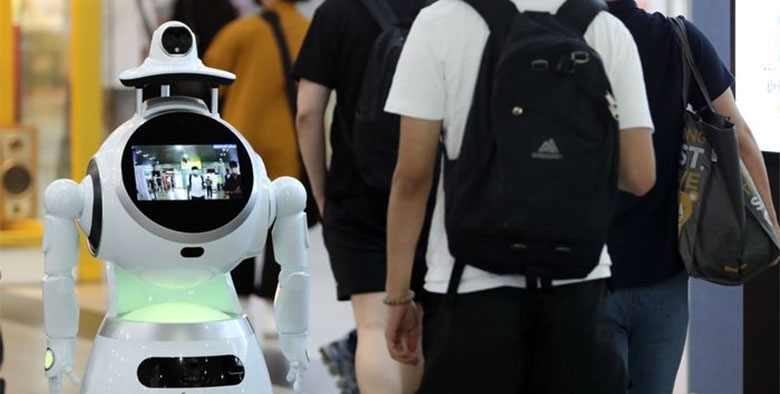- Know Everything About Nipah Virus, Which Is Back In Kerala Again
- Kevin Porter Jr Arrested On His Girlfriend’s Assault Charge
- Market Change Overnight - Know The 8 Things That Did It
- Who Are Alba Baptista And Chris Evans Married On The Weekend?
- Disrupted India vs Pakistan Asia Cup 2023 Match on Reserve Day
- 10 Common Foods That Contain No Calories or Are Very Low in Calories
- Men’s Styling Tips - Know the 9 Common Style Mistakes to Avoid
- Coco Gauff Beats Karoline Muchova and Reaches the US Open Final
- Danny Masterson Gets Life Sentence of 30 Years for Two Rapes
- Experience A Splendid Vacation in Kashmir with These 15 Gorgeous Sights
- India
- Thrusday , May 09, 2024
- Last Published Sep 12, 2023, 6:48:32 PM

AI - Should You Worry About This Emerging Technology?
AI or artificial intelligence is not a new term for us. We have been using it in our professional or personal life for years. But the launch of artificial intelligence ChatGPT in November 2022 and the recent race for the work on generative AI tools have made AI or artificial intelligence a buzzword or trending term in today’s world. Due to the rapid race, we have numerous AI based generative tools, including Open AI’ ChatGPT 4, Google Bard, AlphaCode, Cohere, DELE, Claude, and Synthesia.
People found ChatGPT and allied AI based generative tools helpful in generating texts, codes, business ideas, etc, writing poems, doing academic assignments, and doing allied things. They took these tools as a challenge to their jobs and existence when around 100 leading scientists and business owners including Altman and Geoffrey Hinton (father of AI) started claiming that AI tools might be smarter than human beings and out of control. The worry about AI moved further with the publication of Goldman Sachs’ study, which estimated that artificial intelligence could replace around 300 million jobs across the world.
Professionals like copywriters, designers, developers, and allied others have been facing job losses since March 2023 due to various reasons. And artificial intelligence is one of those reasons. This has made people anxious about their professional life and existence. We, all the concerned people, have many queries in our mind. Questions like Should I worry about AI? and how to get over AI anxiety are some examples of our queries. In this post, you will explore AI evolution, reasons to worry about AI content generation tools, its impact on society, and how to cope with AI anxiety:
The Evolution of AI in Brief
AI or artificial intelligence is not a new term. It is closely related to computing. With it, computers can analyze data in a larger amount and use the same to to make informed business decisions. The origin of AI dates back to 1951 when Christopher Strachey wrote a document on the success of an AI computer program. Based on this program, a game on the Fetrranti Mark 1 computer was developed at the University of Manchester. After that and the invention of the internet and search engines, artificial intelligence (AI) tools have been present among us. The launch of ChatGPT in November 2022 and a race for it after that made it a buzzword. AI based content generation tools are on the rapid and constant advancement path. Experts suggest that AI would be smarter than humans in the future.
Why to Worry About AI or Artificial Intelligence Tools?
AI based content generation tools like ChatGPT, Bard, and DALL-E are very helpful in many ways. Whether you need ideas for a topic or help in composing texts, creating images, writing a poem, getting legal/psychological advice, or making a business decision, you find using these tools convenient. It is, as it helps you save your time, money, and resources. In spite of being helpful, there are some drawbacks or issues that make experts and common people worry about this emerging technology. Here are some of them:
- Plagiarism - Plagiarism is the biggest issue with AI based content generation tools. An AI tool like ChatGPT or Bard generates texts based on the data fed to it or sourced from the internet. So, there is a high chance of plagiarism in generated texts and allied content form. The AI generated content has 10 to 60% plagiarism. In some cases, it could have 100% plagiarism if you use Bing Chat to get an idea on any topic.
- Copyright - Apart from plagiarism, copyright is a major issue. In the training of AI tools, experts have used or have been using data without taking permission from its original author. As per recent news, around 100 well-known authors in the USA have filed a case against Open AI’s founder Altman over copyright infringement.
- Disinformation/inaccurate information - With the rise in AI based tools and their uses for different purposes, there is a flood of information on the internet. Usually, AI generated texts have no sources for specific data or statistics used in the content. It is hard to verify the mentioned data. On the other hand, a human content writer is aware of the information he is producing in the content and cites the respective sources in his write-ups.
- No payment for work performed - The rapid popularity and use of AI tools have raised legal concerns. Lawyers and other professionals are demanding a dispute and regulation and some people have been brought into court cases. Being proved for illegal use means professionals will have no payment from an entity for the work they did.
- Intellectual slugginess - When we talk about artificial intelligence or AI, keep in mind that AIs are programmed machines. They develop a model after slogging via a set of data used in training. And due to this, the model does not alter. Data scientists and computer engineers are constantly busy in retraining the model so that it can have new skills. Until an AI model is not retrained, it can’t keep up itself as per human mind’s growth. So, it is possible to feed data to an AI mode with the development of human minds.
- Security and privacy - In the training of an artificial model, experts use a lot of data that could be personal. We need to think about what would happen if the AI model misuses the data used in its training. Recently, experts have disclosed that they can bypass the way to get information from AI tools like ChatGPT and Bard.
- Automation stupidity - Even after constant development, AI tools in today’s world are not good at doing many things. So, it is easy to find out their flaws. As human beings do things differently so it is impossible to predict the errors AIs would make. When the concerned expert finds a flaw to get over it, there will be another flaw. Due to being different from human intellect, artificial stupidity will be different.
Apart from the above, human credulity, endless abundance, compromise in quality and accuracy of data, prejudice, and complexity challenges are the flaws or reasons that make us worry about the use of AI tools.
Impact of AI on Society
A technical advancement from the past to the present like the industrial revolution leaves its impact on society. And hence, the boom in AI tools is not an exception to it. From the Cambridge Analytica during the 2016 US Presidential Election to the recent automation of some desktop jobs, AI tools have affected people’s thoughts and the way they work or decide. The automation due to the use of AI tools for content generation, different advice, and allied things would bring job losses (that are happening) and a flood of disinformation. If there is no proper regulation on the training of AI tools, there would be a day when these tools would be smarter than humans and would cause a concern for the extinction of human beings.
How to Cope with AI Anxiety
Several studies done across the world suggest that AI would replace around 300 million jobs across the world. Developed countries like the USA, the UK, and Japan would have more impact of job losses due to automation and an increase in the use of AI based tools. A fear of job loss is making many professionals like content writers, designers, developers, and human resource professionals anxious. As a conscious person, you need to deal with this AI anxiety. Here are some steps for your support:
- Realize the presence of AI in almost every business sector in the near future
- Prepare yourself for new career opportunities that require no use of technology. For this, you need to improve your skills or may need to switch your career field
- Take breaks from your work as per your requirements
- Keep yourself updated on AI, AI regulations, and allied things
- Take professional support if required
- Practice deep breathing, meditations, and allied activities to lower your stress or anxiety level












